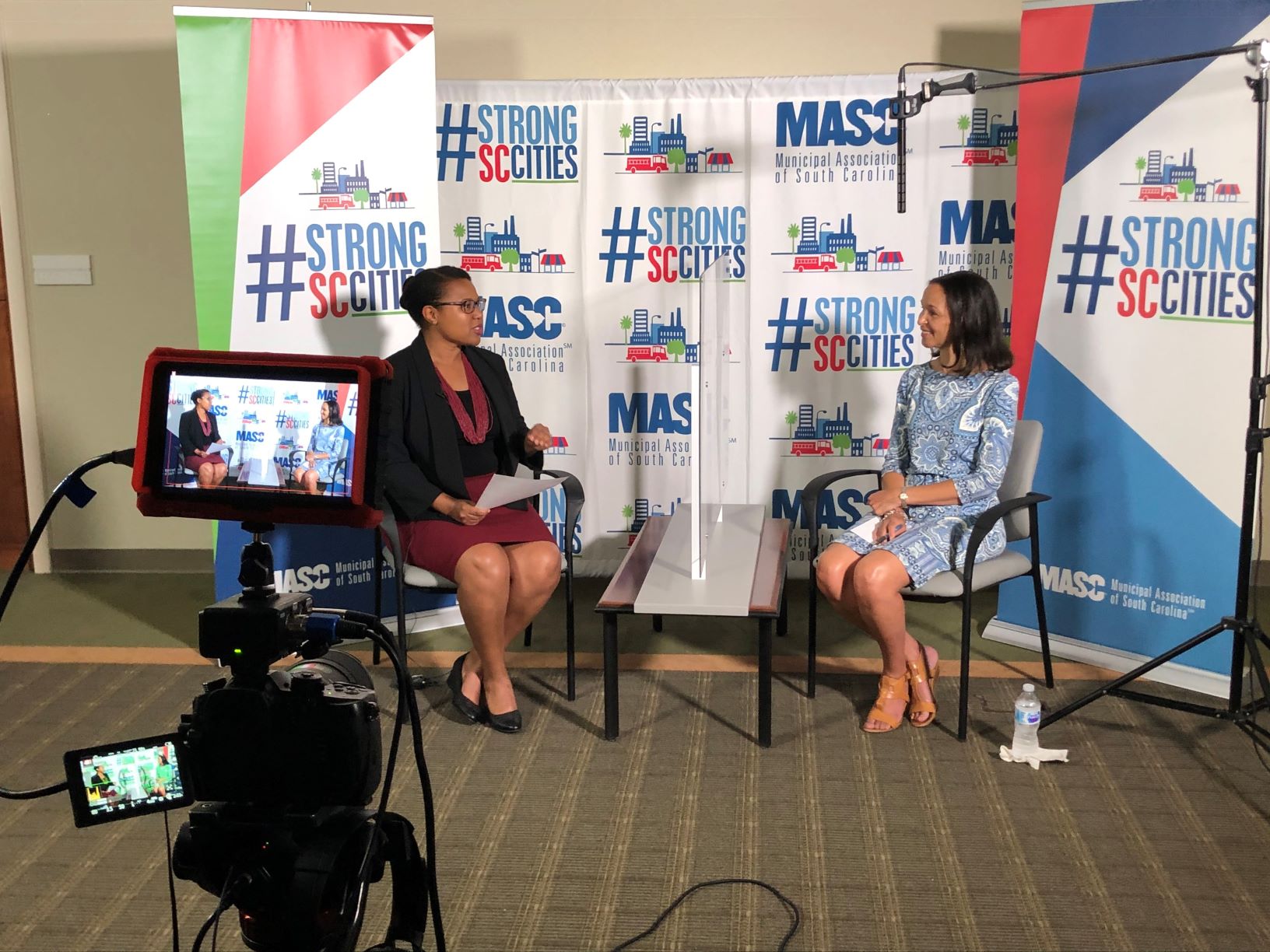COVID-19, the reason why the Municipal Association of SC staged its first-ever Virtual Annual Meeting, also provided the conference with its primary topic of discussion. In a series of videos that remain available on the Association's website, officials dug into the effects of the ongoing pandemic and ways that cities and towns can address it.
Here are some of the topics covered in the video sessions:
Fighting the spread
Dr. Shaniece Criss is a Travelers Rest councilmember, and serves as a health sciences professor at Furman University. Criss joined South Carolina State Epidemiologist Dr. Linda Bell to discuss the ways local government can help slow down the contagion.

Travelers Rest Councilmember Dr. Shaniece Criss, left, speaks with South Carolina State Epidemiologist Dr. Linda Bell during the Municipal Association's Virtual Annual Meeting.
Bell said cities and towns can take valuable steps at the local level. They can help with education on prevention, help build partnerships with community health providers, schools and the faith community to improve access to care.
The two also discussed how systemic issues — even city planning as well housing, public transportation and infrastructure — can create worse public health outcomes for disadvantaged groups.
They also discussed the importance of local governments pursuing diversity on boards and committees to understand all communities' needs better.
"I'd really like to stretch city and town councils to think, let us go out into the various communities to hear their voices," Criss said. "[People] move through the world in a different way, different responsibilities, different stressors. And so we have to be intentional in the way that we reach out to make sure that we hear those voices."
Bell said that the most critical tools for protection of residents and protection in places of business remain high levels of physical distancing and the use of masks.
"There are people in the population who are putting us all at risk," Bell said. "As those behaviors continue, it's going to prolong the period of time that we're going to continue to see illnesses in our community, hospitalizations and even deaths. If communities can come together and recognize that this is not just for the individual, but it is a collective response that's required."
Voting procedures
South Carolina has now staged a primary election in a pandemic and faces a presidential election in November. Chris Whitmire, director of public information and training for the South Carolina State Election Commission, explained the social-distancing challenges of elections in a conversation with Aiken Mayor Rick Osbon.
"The biggest issue is that elections today are conducted pretty much like they were 100, 200 years ago. We gather at a place, near where we live, in our neighborhoods. We gather together with our neighbors and we cast ballots," Whitmire said.
For the June primaries, the General Assembly allowed all voters the choice to vote absentee. The record for absentee ballots in primary jumped from around 60,000 to more than 200,000, Whitmire said. Also, the majority of absentees voted by mail, where in the past most absentee voters submitted ballots in person.
Some issues making the voting process more difficult include the high-risk age of many poll managers, and fewer locations willing to serve as polling places, given the large number of people who will come to vote.
CARES Act funding
South Carolina received more than $1.9 billion from the Coronavirus Aid, Relief, and Economic Security Act, or CARES Act. A portion of that funding will be provided to local governments as reimbursements for COVID-19-related expenditures. This includes $20 million for expenses that took place from March through June 2020, and other funds for expenses made during the remainder of the year. Brian Gaines, division director of the SC Department of Administration's Executive Budget Office, discussed the process with Municipal Association Executive Director Todd Glover.
Glover noted that cities cannot use the funding for revenue replacement, and Gaines described some of the things funds can be used for — personal protective equipment, telework or telehealth expenses, testing and treatment, among others. The SC Department of Administration has engaged the consulting firm Guidehouse, Inc. to vet reimbursement requests. Each city's designated point of contact will make requests through an online portal, with some communication afterward about appropriate documentation.
"It's not going to be as simple as uploading receipts and getting a payment back. You're going to have to demonstrate that these are expenses that are directly related to COVID-19," Gaines said.
Find all of the Virtual Annual Meeting videos at www.masc.sc (keyword: Annual Meeting). Other sessions address city leadership in difficult times, such as the pandemic, economic uncertainty and discussions on race; South Carolina's economic outlook during and after COVID-19; and business license standardization.
